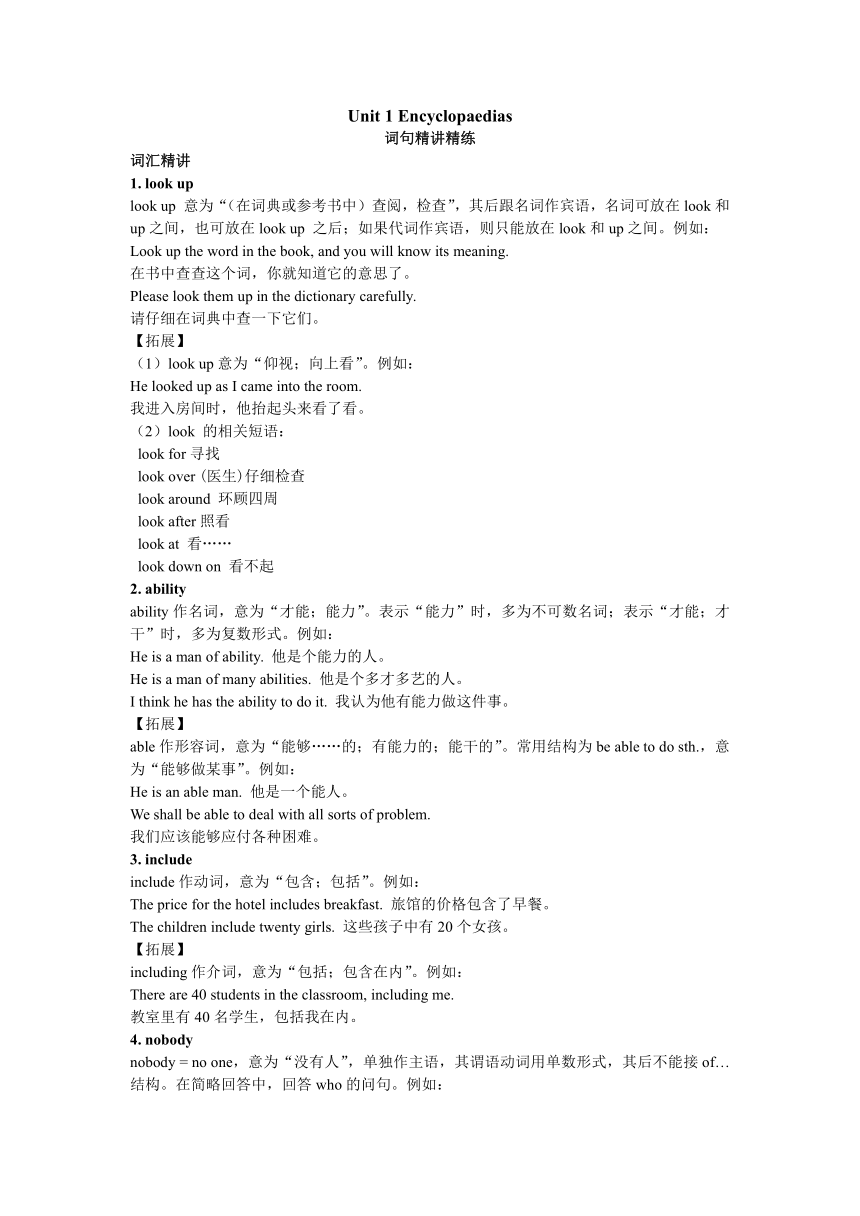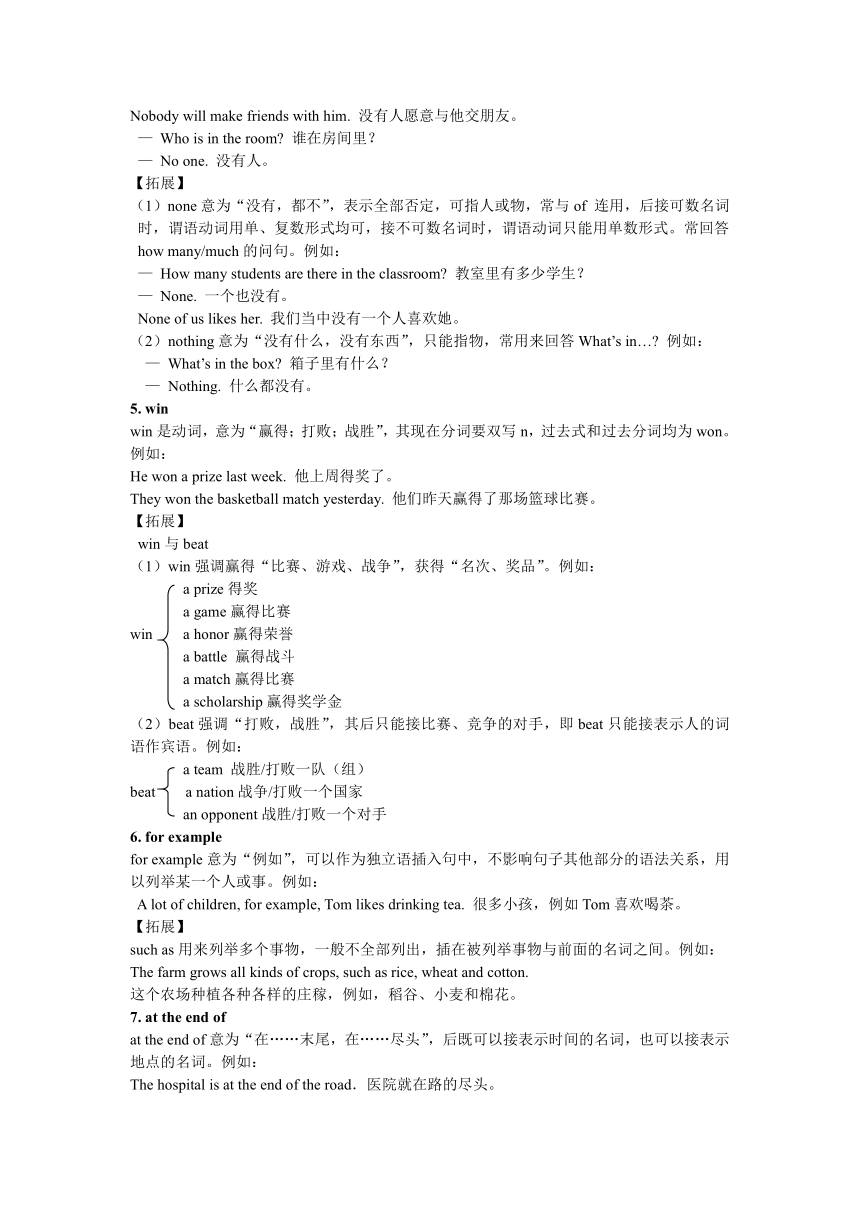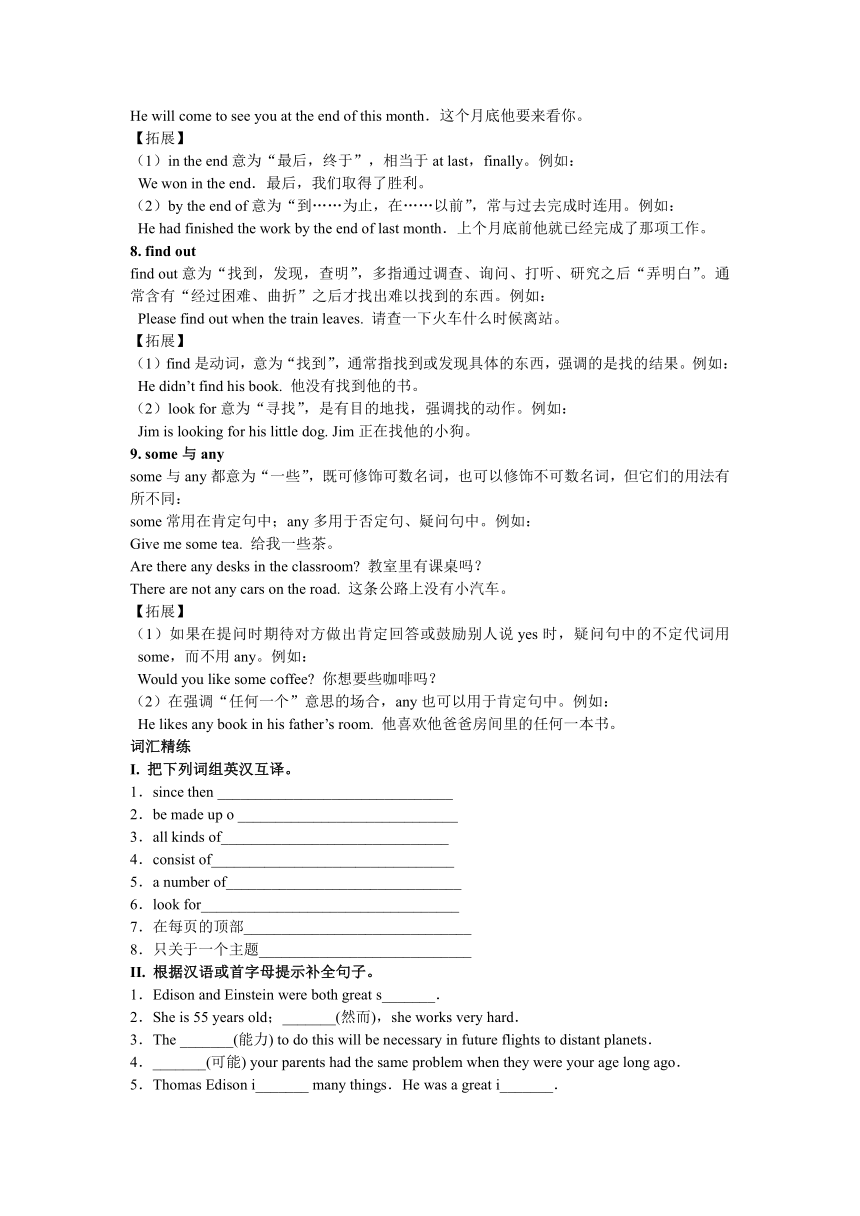英语沪教牛津版八上Unit 1 Encyclopaedias 词句精讲精练(含答案)
文档属性
| 名称 | 英语沪教牛津版八上Unit 1 Encyclopaedias 词句精讲精练(含答案) |

|
|
| 格式 | zip | ||
| 文件大小 | 56.0KB | ||
| 资源类型 | 教案 | ||
| 版本资源 | 牛津深圳版 | ||
| 科目 | 英语 | ||
| 更新时间 | 2022-11-29 17:31:39 | ||
图片预览



文档简介
Unit 1 Encyclopaedias
词句精讲精练
词汇精讲
1. look up
look up 意为“(在词典或参考书中)查阅,检查”,其后跟名词作宾语,名词可放在look和up之间,也可放在look up 之后;如果代词作宾语,则只能放在look和up之间。例如:
Look up the word in the book, and you will know its meaning.
在书中查查这个词,你就知道它的意思了。
Please look them up in the dictionary carefully.
请仔细在词典中查一下它们。
【拓展】
(1)look up意为“仰视;向上看”。例如:
He looked up as I came into the room.
我进入房间时,他抬起头来看了看。
(2)look 的相关短语:
look for寻找
look over (医生)仔细检查
look around 环顾四周
look after照看
look at 看……
look down on 看不起
2. ability
ability作名词,意为“才能;能力”。表示“能力”时,多为不可数名词;表示“才能;才干”时,多为复数形式。例如:
He is a man of ability. 他是个能力的人。
He is a man of many abilities. 他是个多才多艺的人。
I think he has the ability to do it. 我认为他有能力做这件事。
【拓展】
able作形容词,意为“能够……的;有能力的;能干的”。常用结构为be able to do sth.,意为“能够做某事”。例如:
He is an able man. 他是一个能人。
We shall be able to deal with all sorts of problem.
我们应该能够应付各种困难。
3. include
include作动词,意为“包含;包括”。例如:
The price for the hotel includes breakfast. 旅馆的价格包含了早餐。
The children include twenty girls. 这些孩子中有20个女孩。
【拓展】
including作介词,意为“包括;包含在内”。例如:
There are 40 students in the classroom, including me.
教室里有40名学生,包括我在内。
4. nobody
nobody = no one,意为“没有人”,单独作主语,其谓语动词用单数形式,其后不能接of…结构。在简略回答中,回答who的问句。例如:
Nobody will make friends with him. 没有人愿意与他交朋友。
— Who is in the room 谁在房间里?
— No one. 没有人。
【拓展】
(1)none意为“没有,都不”,表示全部否定,可指人或物,常与of 连用,后接可数名词时,谓语动词用单、复数形式均可,接不可数名词时,谓语动词只能用单数形式。常回答how many/much的问句。例如:
— How many students are there in the classroom 教室里有多少学生?
— None. 一个也没有。
None of us likes her. 我们当中没有一个人喜欢她。
(2)nothing意为“没有什么,没有东西”,只能指物,常用来回答What’s in… 例如:
— What’s in the box 箱子里有什么?
— Nothing. 什么都没有。
5. win
win是动词,意为“赢得;打败;战胜”,其现在分词要双写n,过去式和过去分词均为won。例如:
He won a prize last week. 他上周得奖了。
They won the basketball match yesterday. 他们昨天赢得了那场篮球比赛。
【拓展】
win与beat
(1)win强调赢得“比赛、游戏、战争”,获得“名次、奖品”。例如:
a prize得奖
a game赢得比赛
win a honor赢得荣誉
a battle 赢得战斗
a match赢得比赛
a scholarship赢得奖学金
(2)beat强调“打败,战胜”,其后只能接比赛、竞争的对手,即beat只能接表示人的词语作宾语。例如:
a team 战胜/打败一队(组)
beat a nation战争/打败一个国家
an opponent战胜/打败一个对手
6. for example
for example意为“例如”,可以作为独立语插入句中,不影响句子其他部分的语法关系,用以列举某一个人或事。例如:
A lot of children, for example, Tom likes drinking tea. 很多小孩,例如Tom喜欢喝茶。
【拓展】
such as用来列举多个事物,一般不全部列出,插在被列举事物与前面的名词之间。例如:
The farm grows all kinds of crops, such as rice, wheat and cotton.
这个农场种植各种各样的庄稼,例如,稻谷、小麦和棉花。
7. at the end of
at the end of意为“在……末尾,在……尽头”,后既可以接表示时间的名词,也可以接表示地点的名词。例如:
The hospital is at the end of the road.医院就在路的尽头。
He will come to see you at the end of this month.这个月底他要来看你。
【拓展】
(1)in the end意为“最后,终于”,相当于at last,finally。例如:
We won in the end.最后,我们取得了胜利。
(2)by the end of意为“到……为止,在……以前”,常与过去完成时连用。例如:
He had finished the work by the end of last month.上个月底前他就已经完成了那项工作。
8. find out
find out意为“找到,发现,查明”,多指通过调查、询问、打听、研究之后“弄明白”。通常含有“经过困难、曲折”之后才找出难以找到的东西。例如:
Please find out when the train leaves. 请查一下火车什么时候离站。
【拓展】
(1)find是动词,意为“找到”,通常指找到或发现具体的东西,强调的是找的结果。例如:
He didn’t find his book. 他没有找到他的书。
(2)look for意为“寻找”,是有目的地找,强调找的动作。例如:
Jim is looking for his little dog. Jim正在找他的小狗。
9. some与any
some与any都意为“一些”,既可修饰可数名词,也可以修饰不可数名词,但它们的用法有所不同:
some常用在肯定句中;any多用于否定句、疑问句中。例如:
Give me some tea. 给我一些茶。
Are there any desks in the classroom 教室里有课桌吗?
There are not any cars on the road. 这条公路上没有小汽车。
【拓展】
(1)如果在提问时期待对方做出肯定回答或鼓励别人说yes时,疑问句中的不定代词用some,而不用any。例如:
Would you like some coffee 你想要些咖啡吗?
(2)在强调“任何一个”意思的场合,any也可以用于肯定句中。例如:
He likes any book in his father’s room. 他喜欢他爸爸房间里的任何一本书。
词汇精练
I. 把下列词组英汉互译。
1.since then _______________________________
2.be made up o _____________________________
3.all kinds of______________________________
4.consist of________________________________
5.a number of_______________________________
6.look for__________________________________
7.在每页的顶部______________________________
8.只关于一个主题____________________________
II. 根据汉语或首字母提示补全句子。
1.Edison and Einstein were both great s_______.
2.She is 55 years old;_______(然而),she works very hard.
3.The _______(能力) to do this will be necessary in future flights to distant planets.
4._______(可能) your parents had the same problem when they were your age long ago.
5.Thomas Edison i_______ many things.He was a great i_______.
6.My work i_______ cooking meals,cleaning the house.
7.Which team _______(获胜) the game,Class One or Class Two
8.—How much is the book
—Twenty d_______.
9.Sally was b_______ in a small town in London.
III. 用括号中所给单词适当形式填空(每空不限一词)。
1.It is useful _______(learn) a foreign language.
2.Can you help me _______(carry) the box,Lily
3.Remember _______(write) to me when you get to Beijing.
4.I need some ________(potato).Do you have any
5.About two _______(million) people listened to the programme.
IV.语法专项单项选择。
1.— I would like a sandwich and a bottle of milk.
— Sorry,we _______.
A.not have B.don’t C.don’t have some D.don’t have any
2.There isn’t _______ water in the glass. Let’s go and get some.
A. many B. lots C. any D. some
3.They bring _______ apples to the room.
A.a B.an C.one D.some
4.They don’t have _______ milk or rice.
A.some B.a C.any D.an
5.The boy likes _______.
A.a bread B.two breads C.some breads D.some bread
句式精讲
1. Some dinosaurs were as small as chickens.
as...as…中间加形容词或副词原形,表示同级的比较,意为“像……一样……”。例如:
This film is as interesting as that one. 这部电影和那部电影一样有趣。
Your pen writes as smoothly as mine. 你的钢笔书写起来和我的一样流畅。
其否定式为not as/so… as…中间加形容词或副词原形,意为“不像……一样……”。例如:
This dictionary is not as/so useful as you think. 这本字典不如你想象的那样有用。
2. When I was young, I used to keep a notebook.
used to do sth. 意为“过去常常做某事;过去曾经……”,暗示现在已经不再做某事。
He used to be a quiet boy. 他过去是个安静的男孩。
I used to go swimming once a week. 我曾经每周都去游泳。
【拓展】
be/get/become used to doing sth意为“习惯于做某事”。例如:
He came from the north, so he wasn’t used to living in the south.
他来自北方,所以不习惯于住在南方。
3. They were not very good, but they helped me think and dream.
help sb. (to) do sth. 意为“帮助某人做某事 ”。例如:
I often help my mother (to) do some housework.
我经常帮我妈妈做家务。
This book will help (to) improve your English.
这本书会帮助你提高英语水平。
【拓展】
(1)help sb. with sth. 意为“帮助某人做某事 ”。例如:
She helps me with my English. 她帮我学英语。
(2)help oneself to sth.意为“随便(吃……)”。例如:
Help yourselves to some fish, children.
孩子们,请随便吃些鱼吧。
(3)with one’s help意为“在某人的帮助下 ”,此处help作名词,例如:
With her help, I passed the exam.
在她的帮助下,我通过了考试。
4. Just remember to think and to dream.
remember作动词,意为“记得”。与forget意思相反。
(1)remember to do sth.表示“记得要做某事”,事情还没有做。例如:
Remember to turn off the light when you leave. 离开时记得关灯。
(2)remember doing sth.表示“记得曾经做过某事”,事情已经做过了。例如:
He remembered going to Shanghai with his parents when he was five years old.
他记得五岁时曾经和父母去过上海。
【拓展】
类似remember的动词还有:
to do sth. 忘记去做某事
forget
doing sth. 忘记做过某事
to do sth. 尽力做某事
try
doing sth. 尝试做某事
to do sth. 停下来去做另一件事
stop
doing sth. 停止做某事
5. Some were small; others were huge.
some... others...为中考常见句型,表示“一些……另外一些……”。例如:
We can see many people here. Some are walking, others are playing cards.
我们可以在这看到很多人。一些人在散步,另外一些人在打牌。
【拓展】
one… the other…意为“一个……另一个……”。例如:
They have two children. One is a boy, the other is a girl.
他们有两个孩子,一个男孩,另一个女孩。
6. How long did dinosaurs live on Earth…
(1)how long意为“多长时间”,询问某一动作或状态持续了多久,故句中的谓语动词必须是延续性动词或表示状态的连系动词。例如:
How long do you watch TV 你看电视多长时间了?
How long can I keep the book 这本书我可以借多久?
(2)how long还可用来询问长度。例如:
How long is the river 这条河多长?
【拓展】
how often, how soon与how long
词语 词义 用法 答语特征
how often 多久一次 询问动作的频率 often, twice a week等
how soon 多快,过多久 询问时间多快 in+ 一段时间
how long 多久 询问时间多久 for/about+一段时间
句式精练
II. 根据汉语提示,完成句子。
1.Ann出生于1998年5月1日。
Ann ______ ______ ______ May 1st,1998.
2.许多恐龙食草,但是,一些恐龙喜欢食肉。
Many dinosaurs ate plants.______,some dinosaurs liked to eat meat.
3.除了我没人能打开我的前门。
______ can open my front door ______ me.
4.突然它们都灭绝了。
______,they all ______ ______.
5.把那些学生带过来,我有重要的事告诉他们。
Bring those students here;I have ______ ______ to tell them.
6.我们可以在这看到很多人。一些人在散步,一些人在打牌。
We can see many people here. ______ ______ walking, ______ ______ playing cards.
【参考答案】
I. 把下列词组英汉互译。
1.从那时起 2.由……组成 3.各种各样的 4.包括
5.大量的 6.寻找
7.at the top of each page
8.on only one subject
II. 根据汉语或首字母提示完成下列句子。
1.scientists 2.however 3.ability 4.Perhaps/Maybe
5.invented,inventor 6.includes 7.won
8.dollars 9.born
III. 用括号中所给单词适当形式填空(每空不限一词)。
1.to learn 2.(to) carry 3.to write 4.potatoes 5.million
IV.语法专项单项选择。
1. D。否定have前面要加don’t,并且在否定句中应用any代替some。
2. C。water为不可数名词,不能用many修饰;lots不能接名词;本句为否定句,用any而不用some,故选C。
3. D。他们把一些苹果拿到房间里来。apples为复数,只能用some。
4. C。any用于否定句中。
5. D。bread是不可数名词,没有单复数变化,也不能用a来修饰,但可以用“some”或“数词+量词+of”修饰。
【参考答案】
II. 根据汉语提示,完成句子。
1.was born on 2.However 3.Nobody,but
4.Suddenly,died out 5.something important 6.Some are,others are
PAGE
词句精讲精练
词汇精讲
1. look up
look up 意为“(在词典或参考书中)查阅,检查”,其后跟名词作宾语,名词可放在look和up之间,也可放在look up 之后;如果代词作宾语,则只能放在look和up之间。例如:
Look up the word in the book, and you will know its meaning.
在书中查查这个词,你就知道它的意思了。
Please look them up in the dictionary carefully.
请仔细在词典中查一下它们。
【拓展】
(1)look up意为“仰视;向上看”。例如:
He looked up as I came into the room.
我进入房间时,他抬起头来看了看。
(2)look 的相关短语:
look for寻找
look over (医生)仔细检查
look around 环顾四周
look after照看
look at 看……
look down on 看不起
2. ability
ability作名词,意为“才能;能力”。表示“能力”时,多为不可数名词;表示“才能;才干”时,多为复数形式。例如:
He is a man of ability. 他是个能力的人。
He is a man of many abilities. 他是个多才多艺的人。
I think he has the ability to do it. 我认为他有能力做这件事。
【拓展】
able作形容词,意为“能够……的;有能力的;能干的”。常用结构为be able to do sth.,意为“能够做某事”。例如:
He is an able man. 他是一个能人。
We shall be able to deal with all sorts of problem.
我们应该能够应付各种困难。
3. include
include作动词,意为“包含;包括”。例如:
The price for the hotel includes breakfast. 旅馆的价格包含了早餐。
The children include twenty girls. 这些孩子中有20个女孩。
【拓展】
including作介词,意为“包括;包含在内”。例如:
There are 40 students in the classroom, including me.
教室里有40名学生,包括我在内。
4. nobody
nobody = no one,意为“没有人”,单独作主语,其谓语动词用单数形式,其后不能接of…结构。在简略回答中,回答who的问句。例如:
Nobody will make friends with him. 没有人愿意与他交朋友。
— Who is in the room 谁在房间里?
— No one. 没有人。
【拓展】
(1)none意为“没有,都不”,表示全部否定,可指人或物,常与of 连用,后接可数名词时,谓语动词用单、复数形式均可,接不可数名词时,谓语动词只能用单数形式。常回答how many/much的问句。例如:
— How many students are there in the classroom 教室里有多少学生?
— None. 一个也没有。
None of us likes her. 我们当中没有一个人喜欢她。
(2)nothing意为“没有什么,没有东西”,只能指物,常用来回答What’s in… 例如:
— What’s in the box 箱子里有什么?
— Nothing. 什么都没有。
5. win
win是动词,意为“赢得;打败;战胜”,其现在分词要双写n,过去式和过去分词均为won。例如:
He won a prize last week. 他上周得奖了。
They won the basketball match yesterday. 他们昨天赢得了那场篮球比赛。
【拓展】
win与beat
(1)win强调赢得“比赛、游戏、战争”,获得“名次、奖品”。例如:
a prize得奖
a game赢得比赛
win a honor赢得荣誉
a battle 赢得战斗
a match赢得比赛
a scholarship赢得奖学金
(2)beat强调“打败,战胜”,其后只能接比赛、竞争的对手,即beat只能接表示人的词语作宾语。例如:
a team 战胜/打败一队(组)
beat a nation战争/打败一个国家
an opponent战胜/打败一个对手
6. for example
for example意为“例如”,可以作为独立语插入句中,不影响句子其他部分的语法关系,用以列举某一个人或事。例如:
A lot of children, for example, Tom likes drinking tea. 很多小孩,例如Tom喜欢喝茶。
【拓展】
such as用来列举多个事物,一般不全部列出,插在被列举事物与前面的名词之间。例如:
The farm grows all kinds of crops, such as rice, wheat and cotton.
这个农场种植各种各样的庄稼,例如,稻谷、小麦和棉花。
7. at the end of
at the end of意为“在……末尾,在……尽头”,后既可以接表示时间的名词,也可以接表示地点的名词。例如:
The hospital is at the end of the road.医院就在路的尽头。
He will come to see you at the end of this month.这个月底他要来看你。
【拓展】
(1)in the end意为“最后,终于”,相当于at last,finally。例如:
We won in the end.最后,我们取得了胜利。
(2)by the end of意为“到……为止,在……以前”,常与过去完成时连用。例如:
He had finished the work by the end of last month.上个月底前他就已经完成了那项工作。
8. find out
find out意为“找到,发现,查明”,多指通过调查、询问、打听、研究之后“弄明白”。通常含有“经过困难、曲折”之后才找出难以找到的东西。例如:
Please find out when the train leaves. 请查一下火车什么时候离站。
【拓展】
(1)find是动词,意为“找到”,通常指找到或发现具体的东西,强调的是找的结果。例如:
He didn’t find his book. 他没有找到他的书。
(2)look for意为“寻找”,是有目的地找,强调找的动作。例如:
Jim is looking for his little dog. Jim正在找他的小狗。
9. some与any
some与any都意为“一些”,既可修饰可数名词,也可以修饰不可数名词,但它们的用法有所不同:
some常用在肯定句中;any多用于否定句、疑问句中。例如:
Give me some tea. 给我一些茶。
Are there any desks in the classroom 教室里有课桌吗?
There are not any cars on the road. 这条公路上没有小汽车。
【拓展】
(1)如果在提问时期待对方做出肯定回答或鼓励别人说yes时,疑问句中的不定代词用some,而不用any。例如:
Would you like some coffee 你想要些咖啡吗?
(2)在强调“任何一个”意思的场合,any也可以用于肯定句中。例如:
He likes any book in his father’s room. 他喜欢他爸爸房间里的任何一本书。
词汇精练
I. 把下列词组英汉互译。
1.since then _______________________________
2.be made up o _____________________________
3.all kinds of______________________________
4.consist of________________________________
5.a number of_______________________________
6.look for__________________________________
7.在每页的顶部______________________________
8.只关于一个主题____________________________
II. 根据汉语或首字母提示补全句子。
1.Edison and Einstein were both great s_______.
2.She is 55 years old;_______(然而),she works very hard.
3.The _______(能力) to do this will be necessary in future flights to distant planets.
4._______(可能) your parents had the same problem when they were your age long ago.
5.Thomas Edison i_______ many things.He was a great i_______.
6.My work i_______ cooking meals,cleaning the house.
7.Which team _______(获胜) the game,Class One or Class Two
8.—How much is the book
—Twenty d_______.
9.Sally was b_______ in a small town in London.
III. 用括号中所给单词适当形式填空(每空不限一词)。
1.It is useful _______(learn) a foreign language.
2.Can you help me _______(carry) the box,Lily
3.Remember _______(write) to me when you get to Beijing.
4.I need some ________(potato).Do you have any
5.About two _______(million) people listened to the programme.
IV.语法专项单项选择。
1.— I would like a sandwich and a bottle of milk.
— Sorry,we _______.
A.not have B.don’t C.don’t have some D.don’t have any
2.There isn’t _______ water in the glass. Let’s go and get some.
A. many B. lots C. any D. some
3.They bring _______ apples to the room.
A.a B.an C.one D.some
4.They don’t have _______ milk or rice.
A.some B.a C.any D.an
5.The boy likes _______.
A.a bread B.two breads C.some breads D.some bread
句式精讲
1. Some dinosaurs were as small as chickens.
as...as…中间加形容词或副词原形,表示同级的比较,意为“像……一样……”。例如:
This film is as interesting as that one. 这部电影和那部电影一样有趣。
Your pen writes as smoothly as mine. 你的钢笔书写起来和我的一样流畅。
其否定式为not as/so… as…中间加形容词或副词原形,意为“不像……一样……”。例如:
This dictionary is not as/so useful as you think. 这本字典不如你想象的那样有用。
2. When I was young, I used to keep a notebook.
used to do sth. 意为“过去常常做某事;过去曾经……”,暗示现在已经不再做某事。
He used to be a quiet boy. 他过去是个安静的男孩。
I used to go swimming once a week. 我曾经每周都去游泳。
【拓展】
be/get/become used to doing sth意为“习惯于做某事”。例如:
He came from the north, so he wasn’t used to living in the south.
他来自北方,所以不习惯于住在南方。
3. They were not very good, but they helped me think and dream.
help sb. (to) do sth. 意为“帮助某人做某事 ”。例如:
I often help my mother (to) do some housework.
我经常帮我妈妈做家务。
This book will help (to) improve your English.
这本书会帮助你提高英语水平。
【拓展】
(1)help sb. with sth. 意为“帮助某人做某事 ”。例如:
She helps me with my English. 她帮我学英语。
(2)help oneself to sth.意为“随便(吃……)”。例如:
Help yourselves to some fish, children.
孩子们,请随便吃些鱼吧。
(3)with one’s help意为“在某人的帮助下 ”,此处help作名词,例如:
With her help, I passed the exam.
在她的帮助下,我通过了考试。
4. Just remember to think and to dream.
remember作动词,意为“记得”。与forget意思相反。
(1)remember to do sth.表示“记得要做某事”,事情还没有做。例如:
Remember to turn off the light when you leave. 离开时记得关灯。
(2)remember doing sth.表示“记得曾经做过某事”,事情已经做过了。例如:
He remembered going to Shanghai with his parents when he was five years old.
他记得五岁时曾经和父母去过上海。
【拓展】
类似remember的动词还有:
to do sth. 忘记去做某事
forget
doing sth. 忘记做过某事
to do sth. 尽力做某事
try
doing sth. 尝试做某事
to do sth. 停下来去做另一件事
stop
doing sth. 停止做某事
5. Some were small; others were huge.
some... others...为中考常见句型,表示“一些……另外一些……”。例如:
We can see many people here. Some are walking, others are playing cards.
我们可以在这看到很多人。一些人在散步,另外一些人在打牌。
【拓展】
one… the other…意为“一个……另一个……”。例如:
They have two children. One is a boy, the other is a girl.
他们有两个孩子,一个男孩,另一个女孩。
6. How long did dinosaurs live on Earth…
(1)how long意为“多长时间”,询问某一动作或状态持续了多久,故句中的谓语动词必须是延续性动词或表示状态的连系动词。例如:
How long do you watch TV 你看电视多长时间了?
How long can I keep the book 这本书我可以借多久?
(2)how long还可用来询问长度。例如:
How long is the river 这条河多长?
【拓展】
how often, how soon与how long
词语 词义 用法 答语特征
how often 多久一次 询问动作的频率 often, twice a week等
how soon 多快,过多久 询问时间多快 in+ 一段时间
how long 多久 询问时间多久 for/about+一段时间
句式精练
II. 根据汉语提示,完成句子。
1.Ann出生于1998年5月1日。
Ann ______ ______ ______ May 1st,1998.
2.许多恐龙食草,但是,一些恐龙喜欢食肉。
Many dinosaurs ate plants.______,some dinosaurs liked to eat meat.
3.除了我没人能打开我的前门。
______ can open my front door ______ me.
4.突然它们都灭绝了。
______,they all ______ ______.
5.把那些学生带过来,我有重要的事告诉他们。
Bring those students here;I have ______ ______ to tell them.
6.我们可以在这看到很多人。一些人在散步,一些人在打牌。
We can see many people here. ______ ______ walking, ______ ______ playing cards.
【参考答案】
I. 把下列词组英汉互译。
1.从那时起 2.由……组成 3.各种各样的 4.包括
5.大量的 6.寻找
7.at the top of each page
8.on only one subject
II. 根据汉语或首字母提示完成下列句子。
1.scientists 2.however 3.ability 4.Perhaps/Maybe
5.invented,inventor 6.includes 7.won
8.dollars 9.born
III. 用括号中所给单词适当形式填空(每空不限一词)。
1.to learn 2.(to) carry 3.to write 4.potatoes 5.million
IV.语法专项单项选择。
1. D。否定have前面要加don’t,并且在否定句中应用any代替some。
2. C。water为不可数名词,不能用many修饰;lots不能接名词;本句为否定句,用any而不用some,故选C。
3. D。他们把一些苹果拿到房间里来。apples为复数,只能用some。
4. C。any用于否定句中。
5. D。bread是不可数名词,没有单复数变化,也不能用a来修饰,但可以用“some”或“数词+量词+of”修饰。
【参考答案】
II. 根据汉语提示,完成句子。
1.was born on 2.However 3.Nobody,but
4.Suddenly,died out 5.something important 6.Some are,others are
PAGE
